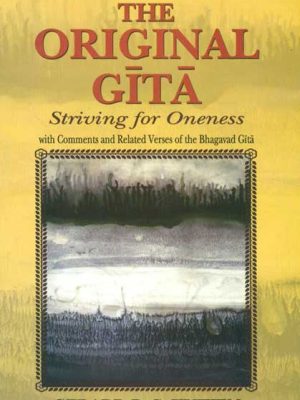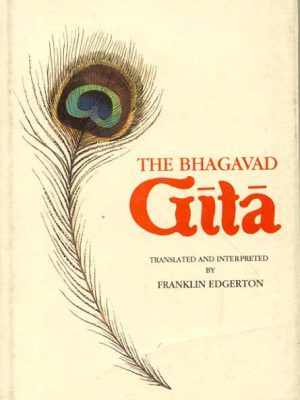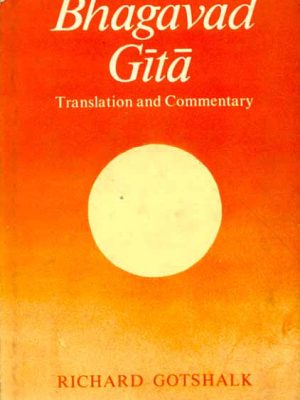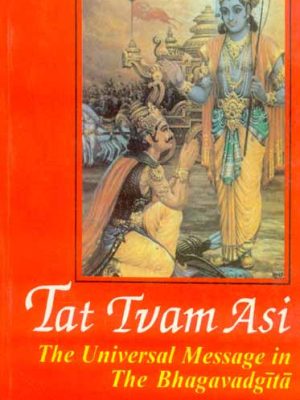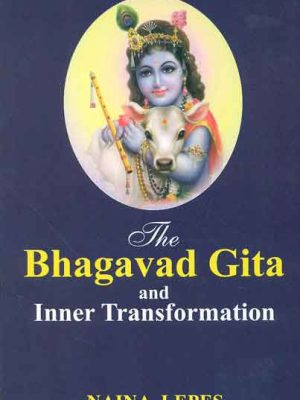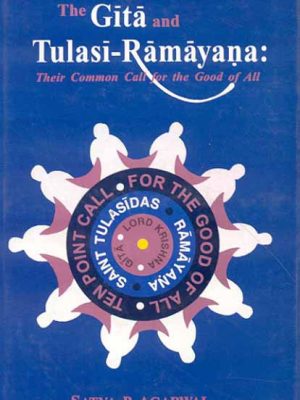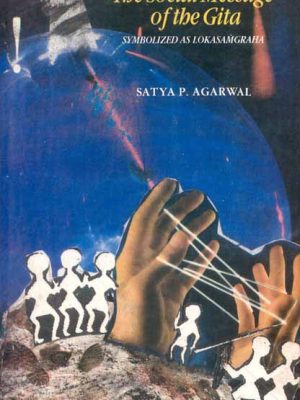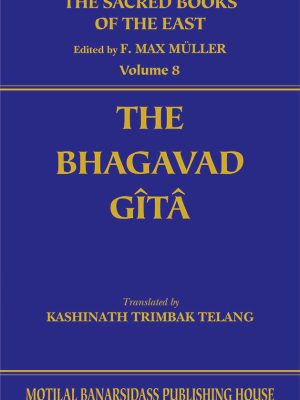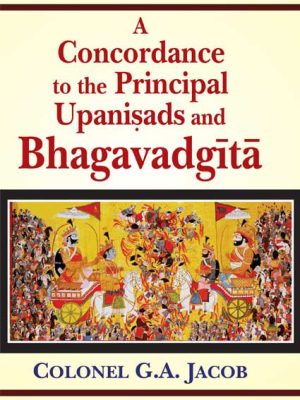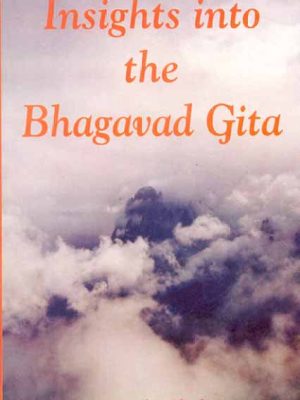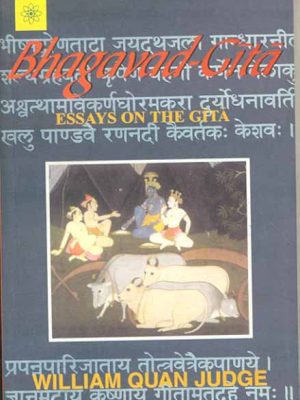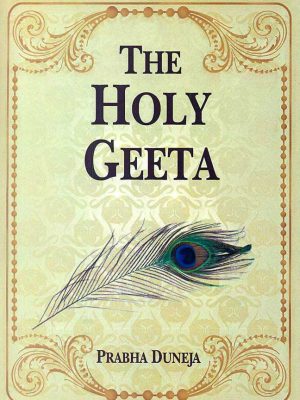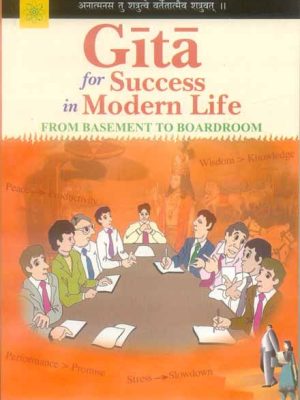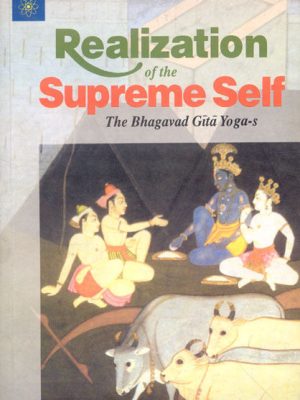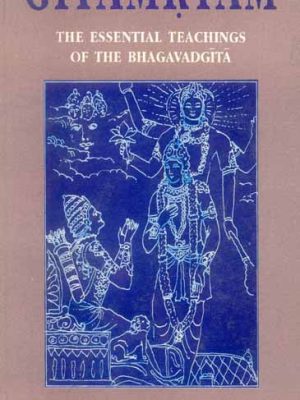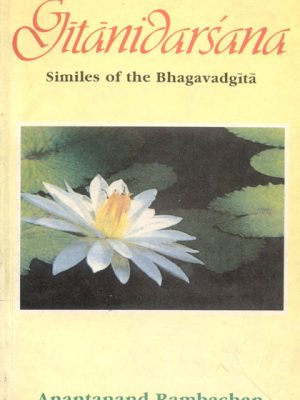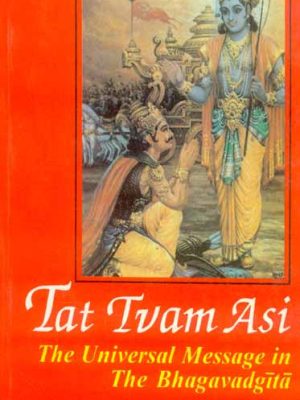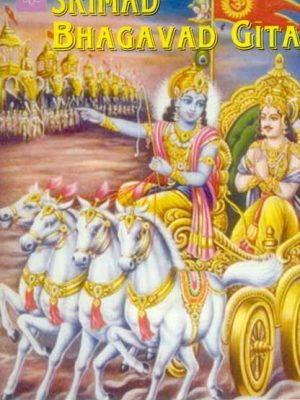Bhagavad Gita
-
-
The Original Gita: Striving for Oneness with Comments and Related Verses of the Bhagavad Gita
We live in a world that functions by seeming ‘dualism’, a perspective that keeps us in bondage. In this book, dualism is addressed and shown to be illusionary, since every pair of opposites implies a third element: the notion of a difference implied by both opposites.
The Original Gita, which predates the Bhagavad Gita, focuses on the basic philosophical and practical essentials of life and living. Here dualism is addressed and shown to be illusionary, since every pair of opposites implies a third element: the notion of a different implied by both opposites. The discussion of what is an ever-present ‘difference’ in such a triunity and how it impacts everything we perceive is pivotal to awakening to a new dimension of observation. It is in the unseen difference that we become aware of opposites, such as long-short, day-night, true-false.
In the first part of the book, the questions-What is thought? What is space-time? What is life-death? – are examined in concise form to give a foundation for the understanding of the philosophy of the Gita. Using this basis of Eastern wisdom, the author comments on the 209 verses of The Original Gita, and a Sanskrit-to-English translation is given of the related 319 verses in the classic Bhagavad Gita that correspond to these verses; these 319 verses can therefore be considered as the core of the Bhagavad Gita. There is no reference in The Original Gita to the battle fought by the Bharatas, nor is there support for the caste system, which were interpolations added later to the Bhagavad Gita. The book includes a glossary for clarification of a number of germane Sanskrit terms, a bibliography, and an index.
Review(s)
About the Author(s)
Dr. Gerard D. C. Kuiken received his Ph.D. from the Delft University of Technology, where he lectured in the fields of fluid mechanics and thermodynamics. He is the author of Thermodynamics of Irreversible Processes: Applications to Diffusion and Rheology, published by John Wiley & Sons. He has studied yoga since his youth, and resides in both The Hague in The Netherlands, and Santa barbara in California, USA.
₹600.00 -
Bhagavad Gita (2 Vols. in One)
To most Visnuites, and to most Hindus, the Bhagavad Gita is what the New Testament is to Christians. It is their chief devotional book, and has been for centuries the principal source of religious inspiration for many millions of Indians. In this two-volume edition (bound in one), Volume I contains on facing pages a transliteration of the original Sanskrit and the author’s close translation. Volume II is Edgerton’s interpretation in which he makes clear the historical setting of the poem and analyzes its influence on later literature and its place in Indian philosophy.
₹495.00 – ₹995.00Bhagavad Gita (2 Vols. in One)
₹495.00 – ₹995.00 -
Bhagavad Gita (Richard Gotshalk): Translation and Commentary
The Bhagavad Gita is a dramatic poem which forms a small part of the great epic, the Mahabharata. The poem is the dialogue through which Arjuna’s doubts are resolved by Krsna’s teaching about the nature and place of action in the ultimate reality of things. The present translation is supplemented by a commentary; both seek to emphasize how the teaching is rooted in the concrete situation, and how its order and structure reflect the changing condition of the conversants and the purpose of the conversation. Footnotes and notes are included to clarify the Sanskrit, to indicate alternative translations, and to note relevant comments from other commentators and translators.
Review(s)
About the Author(s)
₹500.00 -
Tat Tvam Asi (2 Vols.): The Universal Message in The Bhagavadgita
The Bhagavad Gita, a great poem attributed to Rsi Vedavyasa, expounds Vedanta philosophy in the dynamic setting of a battlefield where Lord Krsna reveals the teaching of Vedanta to the warrior prince Arjuna. The essence of the Gita is to make one realise tat tvam asi. We are really the atman or Divinity with an outer covering of the physical body inside which is subtle body consisting of the mind and the intellect. Unfortunately we get attached to the body and develop the ego which is the ‘I’ or ‘My’ -ness in us. It makes us believe that our physical body is real. We forget that we are living because of the life-force inside us. The life-force is the spiritual energy and is known commonly as ‘soul’ or Atman. Tat Tvam Asi is a ‘great Upanisadic sentence’ exhorting us to realise our own divine identity. To realise one’s own divine status, to realise the same divine status in all forms manifest in the universe is to realise the oneness of all beings.
Contents (Vol. 1)
Forword, Message from Swami Hari Har Ji, Note Acknowledgements from the Author, Introduction, Arjuna-Visada-Yoga, Samkhya-Yoga, Karma-Yoga, Jnana-Yoga, Karma-Samnyasa-yoga, Atmasamyama-Yoga, Jnana-Vijnana-Yoga, Rajavidya-Rajaguhya-Yoga, Vibhuti-Yoga.
(Vol. 2)
Visvarupa-Darsana-Yoga, Bhakti-Yoga, Ksetra-Ksetrajna-Yoga, Gunatraya-Vibhaga-Yoga, Purusottama-Prapti-Yoga, Daivasura-Sampad-Vibhaga-Yoga, Sraddhatraya-Vibhaga-Yoga, Moksa-Samnyasa-Yoga.
Review(s)
About the Author(s)
₹1,500.00 -
The Bhagavad Gita and Inner Transformation
This contemporary companion to the Bhagavad Gita addresses the heart of human yearning. It offers the possibility of transforming the battle of life into a path to Truth, a living process. Each chapter presents a road toward our inner, universal Self, bringing a deeper and wider perspective along the way.
A psychological orientation invites the reader to move from abstract idea to individual insight. As the book proceeds, the relationship between the personal and the eternal gradually unfolds in an ever-expanding process of self-discovery.
Quotes from the great teachers are included in the text to inspire, uplift and help us cross over the sea of illusion.
When we can link our heart to that which has been called the first cause, the causeless cause, the way it will carry the momentum of our life toward ultimate fulfillment. This is Krishna’s promise to the person who surrenders his ego to the will of the higher force, be He called Krishna, Christ, Buddha, Yaweh, Self or the Divine Mother.
To live one’s life on the foundation of this secret brings true self-confidence.
For those who worship me alone,
thinking of no “other”
I provide for all they need.
Bhagavad Gita 9:22
Review(s)
About the Author(s)
Naina Lepes is the author of From Maya to Oneness and The Cat Guru. Her teachers are Sai Baba, Swami Chinmayananda and Mother Nature, whereas her formal education includes degrees in music, psychology and counseling.
Formerly, Naina worked as a Jungian-trained psychotherapist in New York, and now lives in the Kumaon region of the Himalayas.
Visit the author’s websites at www.thegitaspace.com and www.catguru.com.
₹695.00 -
The Gita and Tulasi-Ramayana: Their Common Call for the Good of All
This book has identified “the good of all” as the single most important criterion of excellence of any socio-spiritual approach to life’s problems–particularly in the context of the conflict-ridden society of today. The comprehensive coverage of this criterion, as presented in this study, has strong links with (like Ganga, Yamuna, and Saraswati) three life-sustaining streams of thought. The first stream refers to the lokasamgraha-message of the Gita which has been formulated in that scripture from ten different but inter-connected angles. The second stream refers to the jagmangal-message of the Manas which is simpler to grasp and which can also be explained from the same ten angles as applied to the Gita. The third stream refers to the repeated expressions of the concern for “the good of all” which began with the Vedas and which continued as an integral part of the Indian tradition–a steady source that strengthened the calls of the Gita and Manas also.
By putting all these ideas together and by maintaining the interest of the readers, this book has opened the door to a new field of study and research, viz. the Indian contribution to the theory and practice of “the good of all.”
Review(s)
“His arguments are forceful and convincing. The book is a gem which is worth acquiring by all those interested in the subject.”
NATIONAL HERALD
About the Author(s)
Dr. Satya P. Agarwal is a Social Scientist. His academic honors include five gold medals and numerous merit scholarships and research fellowships at various universities. The Governor of the State of Maryland conferred upon him “The Governor’s Citation”, in recognition of his pioneering books as also his contribution to social service. He is the author of several books besides the present one which are widely acclaimed and appreciated by discerning readers. Other honors conferred on him include (i) the Kunti Goyal International Award, (ii) the Special Award of Manas Sangam, and (iii) the International Tulasi Award.
₹395.00 -
The Social Message of the Gita Symbolized as Lokasamgraha: (Self Composed Skt. Slokas with Eng. Comm.)
This book is a landmark in the wide panorama of Gita Literature, the universal nature of which is reflected in the use- in the form of prose as well as poetry-of an increasing number of the world’s languages. As the first book to utilize original verses in modern Sanskrit to convey the social massage of the Gita, it not only fills a significant linguistic gap but also focuses attention on social issues which call for urgent action by karmayogins.
Review(s)
About the Author(s)
Dr. Satya P. Agarwal is a Social Scientist. His academic honours include five gold medals and numerous merit scholarships and research fellowships at various universities. The Governor of the State of Maryland conferred upon him “The Governor’s Citation”, in recognition of his pioneering books as also his contribution to social service. He is author of several books besides the present one which are widely acclaimed and appreciated by the discerning readers. Other honours conferred on him include: (i) Kunti Goyal International Award, (ii) Special Award of Manas Sangam and (iii) International Tulasi Award.
₹395.00 -
The Bhagavadgita (SBE Vol. 8)
Review(s)
About the Author(s)
₹750.00The Bhagavadgita (SBE Vol. 8)
₹750.00 -
A Concordance to the Principal Upanisads and Bhagavadgita
One of the major difficulties in appreciating the various commentaries on Vedanta Sutras and other ancient Indian philosophical texts is that numerous citations from the Upanishads and the Bhagavadgita are found in them without any exact authenticated reference to the original source. With a view to overcoming this difficulty by providing relevant cross-references, as also to furnishing useful material to students of philology and lexicography, Col. Jacob has compiled this book. This volume owes its existence to a pressing sense of need.
Review(s)
About the Author(s)
₹1,995.00 -
Insights Into the Bhagavad Gita
Vimala Thakar gave a series of inspired talks on the Bhagavad Gita in three separate seminars, during 1992 and 1993 in Italy. To her Bhagavad Gita is very sacred because it deals with the organic wholeness of life; and the inbuilt complexity of life, It affirms the interplay between the micrecosm and macrocosm and persuadesus to remain united with the ultimate reality, not only to intellectual understanding, but through everything that we do, at every moment.
Review(s)
” The book is indeed a product of author’s realization and deep spiritual insights on the mental anguish and obstacles such as ego of Arjuna, which are specified timely by Krishna, as teacher, referring appropriate example from the holy Gita and his etern
About the Author(s)
₹795.00Insights Into the Bhagavad Gita
₹795.00 -
Bhagavad Gita: Combined with his Essays on the Gita
The Gita offers a succinct summary of ancient Indian philosophy, with particular emphasis on the Supreme Spirit as both immanent and transcendent. Since its introduction into the Western world some two hundred years ago, the poem has been translated into practically every modern tongue, and is today the most widely read and discussed of all Eastern scriptures. Its emphasis is on two aspects selflessness. Recension of the Gita, combined with illuminating Essays on the poem make the present work unique. It works as a bridge between the Gita’s oriental approach and modern occidental thought.
Review(s)
About the Author(s)
WILLIAM Q. JUDGE, a renowned Theosophist of his time, had profound
knowledge and deep insight into the study of Theosophy. He was the writer
of highly acclaimed ideas that transmit perfectly the wisdom of Theosophy
to the lay readers.
₹250.00 -
The Holy Geeta: Srimad Bhagawad Geeta, Sanskrit and Romanized Text with English Translation
The message of the holy dialogue between Lord Krishna and Arjuna in the Bhishma Parvan episode of Mahabharata has been held in deep reverence by the sages, philosophers and the learned scholars all over the world. The teachings of Geeta are universal and meant for the welfare of
entire creation. There are hundreds of commentaries on Bhagawad Geeta both in Indian and in many foreign languages.
In the words of Dr. Radhakrishnan, ‘for centuries people have found comfort in this great book which sets forth in precise and penetrating words the essential principles of a spiritual religion which are not contingent on ill-founded facts, unscientific dogmas or arbitrary fancies.’
The present translation is only a humble addition to the work which has been accomplished
earlier by the Geeta scholars. This translation with Romanized Sanskrit verses has been brought
forward in order to encourage the modern generation into the study of this ancient scripture.
This work is also meant to help the Indians living in foreign countries and to arouse the interest of foreigners into the recitation of Sanskrit verses and to understand the meaning of Geeta in a simple flexible and comprehensible language.
Review(s)
“The Bhagawad Geeta is a first-hand guide to the ancient roots of Vedic religion.” – Dr. R.C. Zeahner
“When doubts haunt me, when disappointments stare me in the face, and I don’t see any ray of hope on the horizon, I turn to The Bhagawad Geeta and find a verse to comfort me.” – Mahatma Gandhi
“The Bhagawad Geeta is perhaps the most systematic spiritual statement of the Perennial Philosophy.”-Aldous Huxley
About the Author(s)
Founder and president of the Geeta Society, is also an active member of the Women’s Federation for world peace and the United Nations Association, USA. She is also the chairwoman of the Women’s Interfaith Circle of Service/CC-URI and a recipient of the Global Citizen award, given by UNA-the Commonwealth Club San Francisco, the Parliament of World’s Religions, schools, universities, churches, mosques, and interfaith conferences.
Mrs. Duneja, a graduate from the Sanskrit University of Kurukshetra, is a well-known Vedic scholar and a devotee of Lord Krishna. She is the author of the Legacy of Yoga in Bhagawad Geeta, Mantra and the Modern Man, Bhagawad Geeta: The Gospel of Timeless Wisdom, and has also recorded several series of lectures on the science of yoga and meditation, the secret powers of mantra, and the Bhagawad Geeta. For more information visit her website: holygeeta.org and contact her at duneja@aol.com
₹100.00 -
Gita For Success In Modern Life: From Basement to Board Room
This book underscores that the Gita is not for abandoning active life but for reconstructing.
The book focuses particularly on the modern man. It does not deal with an imaginary or an ideal situation but with man’s real life. It recognises that man is caught up in a whirlpool of conflicting values and tries to resolve and reconcile them. The book explores various dimensions of man’s life – as an individual, as a family member, as a social being and as a businessman, as well.
The book selects only a few chapters and shlokas and brings out the principal teachings of the Gita which are of direct relevance in the context of contemporary modern life.
Review(s)
“Parables and metaphors in the Gita have been used as in other ancient scritures and literature to explain the subtle meanings in a simple manner to the reader……Separate chapters have been devoted to different ingredients of Karma Yoga……A Pe
About the Author(s)
₹250.00 -
Realization of the Supreme Self: The Bhagavad Gita Yogas
This book presents the Gita yoga in the light of explanations by Sankara.
The Gita can be misread, as Sankara says. It is not a gradual ascent to the
final devotion of the sould to a Lord high above. The whole basis of Gita
yoga is confirmation through experiments. not mere exhortion. This highly
significant book presents the Gita as a training manual for spiritual
practice.
Review(s)
About the Author(s)
₹295.00 -
Gitamrtam: The Essential Teachings of the Bhagavad Gita
Gitamrtam is a concise and insightful discussion of the central themes of the Bhagavadgita. Beginning with the Gita’s teaching about the nature and role of the incarnation, Dr. Rambachan identifies kama, a state of desiring and wanting, as life’s fundamental problem. The proper resolution of this human dissatisfaction is to be found in the understanding of oneself to be the full and complete self (atman). Such knowledge, Dr. Rambachan vigorously argues, enables one to act in the world from a deep sense of inward peace and fulfilment. Self-knowledge transforms human motivation and liberates us from the narrow confines of selfish action to the freedom of serving others. Dr. Rambachan establishes that the Bhagavadgita ideal is not indifference to the world and the severing of human relationships, but
love and compassion born out of the identity of oneself with all beings. In a lucid and accessible style, Dr. Rambachan shows how the Gita’s teaching makes possible a love which embraces all and infuses each act with compassion.
Review(s)
About the Author(s)
ANANTANAND RAMBACHAN is an Associate Professor of Religion at St. Olaf
College in Minnesota. A native of Trinidad and Tobago, Dr. Rambachan earned
his Ph.D. at the University of Leeds in the United Kingdom. He was awarded
Trinidad’s second highest national honor, the Chaconia Gold Medal, for
public service in 1987.
₹195.00 -
Gitanidarsana: Similies of the Bhagavad Gita
In the Bhagavad Gita, Krishna employs various teaching methods to aid Arjuna’s comprehension and to remove his misunderstandings. He often explains a difficult statement with the aid of a simile drawn from everyday human experience and the Bhagavad Gita contains some of the most suggestive and beautiful similes in the entire sacred literature of Hinduism. The similes of Krishna add a beautiful visual dimension to words and invite reflection and exploration.
In this text, Prof. Rambachan has chosen twelve similes for reflection. They deal with diverse but interrelated matters such as the nature of the self, death, scriptures, self-control, peace, wisdom, and the nature of God. These similes offer an exciting entrance into the Hindu worldview and the author invites us to explore the inexhaustible richness of each image.
Review(s)
“…Each of the similes contains an inexhaustible richness of meaning to which the author adds significant classification. The similes open up an easy entrance to the basic Hindu thought which otherwise could be elusive for easy comprehension. An inte
About the Author(s)
ANANTANAND RAMBACHAN is an Associate Professor of Religion at St. Olaf
College in Minnesota. A native of Trinidad and Tobago, Dr. Rambachan earned
his Ph.D. at the University of Leeds in the United Kingdom. He was awarded
Trinidad’s second-highest national honor, the Chaconia Gold Medal, for
public service in 1987.
₹225.00 -
Tat Tvam Asi (2 Vols.): The Universal Message in The Bhagavadgita
The Bhagavad Gita, a great poem attributed to Rsi Vedavyasa, expounds Vedanta philosophy in the dynamic setting of a battlefield where Lord Krsna reveals the teaching of Vedanta to the warrior-prince Arjuna. The essence of the Gita is to make one realize tat tvam asi. We are the atman or Divinity with an outer covering of the physical body inside which is a subtle body consisting of the mind and the intellect. Unfortunately, we get attached to the body and develop the ego which is the ‘I’ or ‘My’ -ness in us. It makes us believe that our physical body is real. We forget that we are living because of the life force inside us. The life force is the spiritual energy and is known commonly as ‘soul’ or Atman. Tat Tvam Asi is a ‘great Upanisadic sentence’ exhorting us to realize our own divine identity. To realize one’s divine status, to realize the same divine status in all forms manifest in the universe is to realize the oneness of all beings.
Contents (Vol. 1)
Forward, Message from Swami Hari Har Ji, Note Acknowledgements from the Author, Introduction, Arjuna-Visada-Yoga, Samkhya-Yoga, Karma-Yoga, Jnana-Yoga, Karma-Sannyasa-yoga, Atmasamyama-Yoga, Jnana-Vijnana-Yoga, Rajavidya-Rajaguhya-Yoga, Vibhuti-Yoga.
(Vol. 2)
Visvarupa-Darsana-Yoga, Bhakti-Yoga, Ksetra-Ksetrajna-Yoga, Gunatraya-Vibhaga-Yoga, Purusottama-Prapti-Yoga, Daivasura-Sampad-Vibhaga-Yoga, Sraddhatraya-Vibhaga-Yoga, Moksa-Samnyasa-Yoga.
Review(s)
About the Author(s)
₹1,295.00 -
Srimad Bhagavad Gita
Srimad Bhagavad Gita presents “The Sermons from the Illustrious Lord Krsna to Arjuna,” compiled by the great ancient seer, Vyasa. Here is a rendering of Srimad Bhagavad Gita into English. While translating from Sanskrit into English, the author has spent about ten years in first realizing and then choosing the exact equivalent English words for translation so that the beauty, substance, meanings, dignity and grace of the original is not disturbed. Though the melody and magic of the verses is difficult to recapture in another medium, yet the author has tried his utmost to bring it in its best. To feel the dignity of phrase and the intensity of utterance, the author has given the text in Roman script so that those who know Sanskrit can enjoy its fullness while pondering over in its original, whereas others who do not know Sanskrit also get a fairly correct idea of the spirit of the poem. After putting up the text in Roman, it has been rearranged to facilitate the meaning of the verse. Then appear the word-for-word meaning and lastly the verse has been translated into English as exactly as possible so as not to deviate at all from its original.
Review(s)
About the Author(s)
Kailash Nath Kalia was born in Talwan (Punjab) and became increasingly interested in Indian philosophy during his active participation in the struggle for Indian independence. In 1950, he joined the Vishveshvaranand Vedic Research Institute (Hoshiarpur, Punjab), serving as its Assistant Director. In 1966 he moved to the United Kingdom and founded the Vivekananda Centre, a charitable organisation whose ethos allied service to spirituality. The Bhagavad Gita was fundamental to the author’s lifelong charitable work and service. He believed that the Gita’s inspirational teachings provided spiritual guidance for the individual and enabled mutual respect and understanding between people. Kailash Nath Kalia passed away on June 23, 1989. This book has been prepared posthumously from the manuscript he left behind. It is hoped that this work will help to disseminate the Gita’s message of universal harmony and spiritual enlightenment and so fulfil his cherished wish. *The author’s proceeds will be donated to charity.*
₹395.00Srimad Bhagavad Gita
₹395.00




